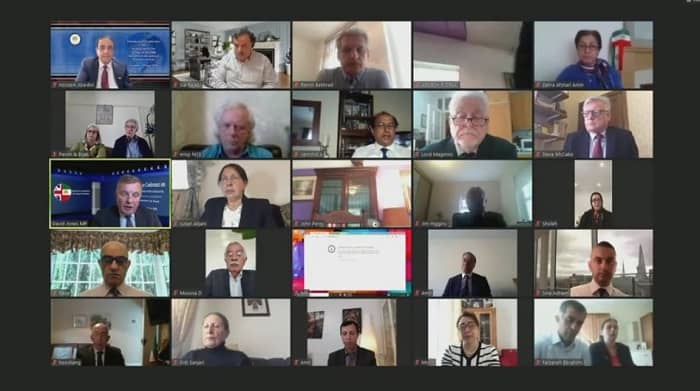
By Jubin Katiraie
Iran’s Supreme Leader Ayatollah Ruhollah Khomeini issued a fatwa in July 1988 ordering the execution of imprisoned opponents, including those who had already been tried and were serving their prison terms. This was the beginning of what turned out to be the biggest massacre of political prisoners since World War II.
Following the decree, some 30,000 political prisoners were extra-judicially executed within several months.
Khomeini’s decree called for the execution of all political prisoners affiliated to the main opposition group People’s Mojahedin Organization of Iran (PMOI or MEK) who remained loyal to the organization.
Now for many years the people of Iran and the families of the 1988 victims are seeking justice. According to this demand in a British Parliamentary online conference discussed this issue to find a way to bring the Iranian regime to justice and force the international community to make the regime accountable.
MP David Jones started the session as he said: “The 1988 massacre is often referred to as the worst crime since the Second World War. The alarming human rights situation in Iran is a serious matter for the international community. For too long, the regime has escaped accountability.
“Allowing a repressive theocratic regime to buy weapons from the market will end in disaster. The issue of accountability is an important process of stopping Tehran’s malign activities and its pursuit of nuclear weapons.”
MP Steve McCabe: “The Iranian regime is planning another trumped-up charge against Nazanin Zaghari-Ratcliffe. From Nazanin’s life to nuclear weapons, we cannot negotiate with this regime. We cannot trust them. The lifting of sanctions encouraged the mullahs to think we do not care where they buy weapons from. They incite more violence through their network of proxies.
“We have already failed the Iranian people by ignoring the 1988 massacre, by giving the regime billions of pounds as a result of the failed nuclear deal, by not recognizing the opposition and NCRI President-elect Maryam Rajavi. The people we are dealing with, like Ebrahim Raisi, are responsible for the 1988 massacre. They continue to slaughter people, including 1,500 people in the November 2019 protests.”
Mrs. Maryam Rajavi President-elect of the NCRI in a message to the conference demand:
“To put an end to the crimes of this regime, and to counter its warmongering actions in the region, the following steps are necessary:
- An international fact-finding mission must be set up to seek justice for victims of the 1988 massacre, and hold the perpetrators of this grave crime against humanity accountable.
- The UN Security Council must address the terrible situation of human rights in Iran. The UN Security Council must send to Iran an international delegation accompanied by representatives of the Iranian Resistance. They must visit the regime’s medieval prisons, visit the prisoners and particularly, meet those arrested during the November 2019 uprising.
- As the Iranian Resistance called for, just a few hours after signing of the JCPOA, the six UN resolutions must be re-imposed and all sanctions on weapons sales to Iran must be re-imposed. Supporting the Iranian people’s desire to overthrow the regime ruling Iran is necessary for peace and stability in the region.”
MP Bob Blackman said about the EU’s wrong policies toward Iran which makes this regime more aggressive against the people: “Sadly, we are aligning ourself with the failed policy of appeasement pursued by the European Union, which for the last four decades, has provided the regime in Iran with immunity for its egregious human rights violations including the 1988 massacre of 30,000 political prisoners, and on its terrorism to preserve diplomatic dialogue, prioritize trade and, in recent years, keeping alive a disastrous and flawed nuclear deal that will allow Iran to advance its nuclear and missile program.”
Kirsty Brimelow QC said: “The evidence reported has not been denied by Iran. I have heard accounts of family members and survivors of the 1988 massacre, including a father who was told to pay for the bullets used to kill his daughter. One woman said she believed her son might still be alive. She said she still sleeps near the door, so she does not miss the news of the return of her son.”
Michelle Mulherin, former Irish Senator: “When a government turns on its own people, it is the obligation of the international community to take action. There are families who very much want to achieve justice. I support the call and the efforts, and it is an issue that I have taken up with our Minister of Foreign Affairs and I will continue to do so.”
Irish Senator Ivana Bacik said: “As Amnesty International documented, Iranian authorities have treated the killings as state secrets. No official has been brought to justice.
“I support your call for the establishment of an investigation into this crime. Along with my colleagues, I will be proactive to bring attention to this cause. There should be an investigation in the extra-judicial killings. The responsibility lies with us to not let this issue be swept under the carpet. The regime should know that the world is watching.”
Tahar Boumedra, legal expert and former head of the UNAMI: “The UN has been informed. The successive special rapporteurs on the situation of human rights in Iran have consistently called on Iran to investigate this crime. The special rapporteur has been banned from visiting Iran.
It is clear Iran is unwilling to investigate. The UN has proven to be reluctant to impose such an investigation. What is next? The reality is the UN General Assembly resolution should focus on setting up an independent investigation into this crime instead of calling on Iran to investigate on its own. We have to be realistic and take action. And that action is setting up an independent commission and investigation.”
Read More:


